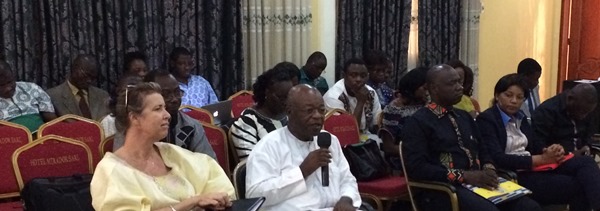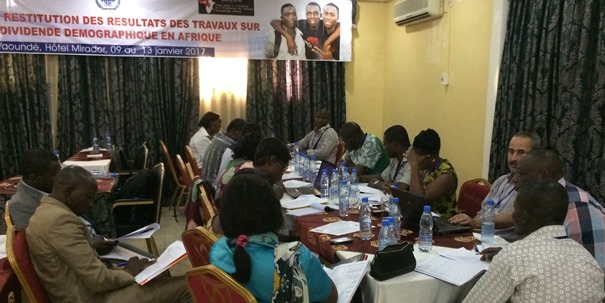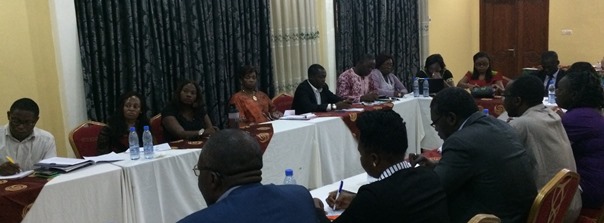Workshop to communicate results of the Network’s research on the Demographic Dividend in AfricaYaoundé, Cameroon, 9-13 January 2017 Organized by the IUSSP Network on Strengthening Demographic Training in Francophone Africa (FraNet)
The Network's Steering Committee : • Chair: Parfait Eloundou Enyegue (Cornell University) • Members: Gervais Beninguisse (Institut de Formation et de Recherche Démographiques), Philippe Bocquier (Université Catholique de Louvain), Valérie Delaunay (Institut de Recherche pour le Développement), Jean François Kobiané (Université Ouaga I Pr Joseph Ki-Zerbo), Richard Marcoux (Université de Laval).
The workshop on the results of the Network’s research on the Demographic Dividend in Africa was held from 9 to 13 January 2017 at the Mirador Hotel in Yaoundé, Cameroon. This workshop is part of the activities of the International Union for the Scientific Study of Population (IUSSP) Network for the Strengthening of Demographic Training in Francophone Africa (FraNet). The workshop was facilitated by the Institut de formation et de Recherche Démographiques (IFORD) through its Cellule d'Appui à la Recherche et à l'Enseignement des Institutions Francophones d'Afrique (CARE-IFA) and the FraNet network. The workshop was attended by 73 researchers, policy makers, journalists and other partners from the following countries: Algeria, Burkina Faso, Cameroon, Canada, Central African Republic, Côte d'Ivoire, France, Luxembourg and the United States.
This 5-day workshop and conference was a plea focused on the demographic dividend and its implications for the economic emergence of African countries. It builds on a series of training workshops held on the analysis of the demographic dividend in Africa, which examined the dividend in the realm of schooling (in Ouagadougou, November 2013 and Yaoundé, March-April 2014) and economic growth (in Ouagadougou, September 2014; Yaoundé, January 2015; and Johannesburg, November and December 2015). Its main objective was to promote the concept of the Demographic Dividend among policy makers and journalists in order to facilitate national ownership.
Context The African continent will reach over the next decade a decisive turning point in its socio-economic development. The decisiveness of this turning point holds to three major facts:
The first and best known is the increased pressure of development goals, whether expressed through national action plans, the Agenda 2063 for Africa, or the 2030 Agenda for Sustainable Development. Whether regional or national, these projects are remarkably ambitious both in terms of the wide range of objectives and the levels to reach for each target.
A second major fact, less well known, is the rise in inequalities in Africa, both between countries and within countries. At a time when inequalities between countries of the world tend to level, divergence between African countries is increasing. Moreover, even within African countries, inequality appears to be on the rise. According to estimates from the World Bank for the past ten years, five African countries are among the 10 countries with the highest levels of inequality in the world. These internal inequalities could further increase due to selective globalization, a breakdown of traditional solidarity, increased competition for employment and a decline of the public sector.
The third key factor, which is what this conference focused on, is population and demographic change. Africa has begun its demographic transition, with a shift in average fertility from 5.7 to 4.7 children per woman between the years 1990 and 2015. Although the African population will continue to grow in the years to come (its population is expected to double between 2015 and 2050), this fertility decline will induce major changes in the age composition of the population. In particular, the dependency ratio, the average number of dependents (children and elderly people) that each adult has to take care of, would decline from 1.2 to 0.9 dependents. This decrease would be temporary. With the increase in life expectancy and the ageing of the population, the dependency rate (for Africa in general) will eventually rise, with an increase in expenses related to elderly care. The next quarter of a century thus offers a window of opportunity and the possibility of a demographic dividend which Africa could use to accelerate its economic development. However, this demographic dividend is not automatic. It will only be achieved if policy makers implement supporting policies in several sectors. Many experts agree that the success of African countries in containing inequalities and promoting sustainable development over the next quarter of the century will be determined largely by how this demographic opportunity is managed.
Objectives In this context, the objective of this conference/workshop was to discuss the potential magnitude and conditions required for African countries to seize this demographic dividend. The conference focused on:
Programme The activities took place in plenary and workshop sessions. During the plenaries, several presentations were made, organized around the following themes:
During exchanges between participants and presenters, many questions focused on the concept of emergence of African countries and its link with the concept of the demographic dividend.
During the workshops, researchers of the FraNet network worked to finalize the analyses of two forthcoming volumes on the economic and schooling dimensions of the demographic dividend. They also worked to develop a communication tool to deepen the understanding of the concept of the demographic dividend by preparing a document entitled "50 Questions on the Demographic Dividend".
On Tuesday 11 January, a working dinner was organized between FraNet researchers and journalists specialized in health and development. The aim of the meeting was to consolidate the partnership between journalists and researchers and foster a framework where synergy between media professionals and researchers can contribute to the popularization of population issues, including those related to the demographic dividend.
See also: • The workshop report (in French). • The FraNet network's web page. Funding: The IUSSP Network for Strengthening the Demographic Training in Francophone Africa is supported by The William and Flora Hewlett Foundation. |
|



